Ethics in Healthcare: An Analysis of the NHS Case Study Report
VerifiedAdded on 2021/01/02
|11
|3797
|412
Report
AI Summary
This report provides an in-depth analysis of ethical issues within the National Health Service (NHS), focusing on a case study involving conflicts of interest, transparency concerns, and the role of ethical leadership. The report is divided into two parts, with the first part detailing a reporting brief that outlines the ethical dilemma, conflict of interests, and the impact of ethical choices on stakeholders. The second part assesses ethical leadership and organizational practices. The report explores key ethical dimensions such as conflict of interest and transparency, examining the NHS's failures in these areas. It discusses the role of business in society and identifies stakeholders, including CEOs, patients, and the government, and their expectations. The report applies ethical theories like utilitarianism and deontology to the NHS case, offering recommendations to improve ethical practices and prevent future issues, such as implementing stricter policies to address conflicts of interest and enhance transparency. The report underscores the importance of ethical decision-making for organizational success and reputation.
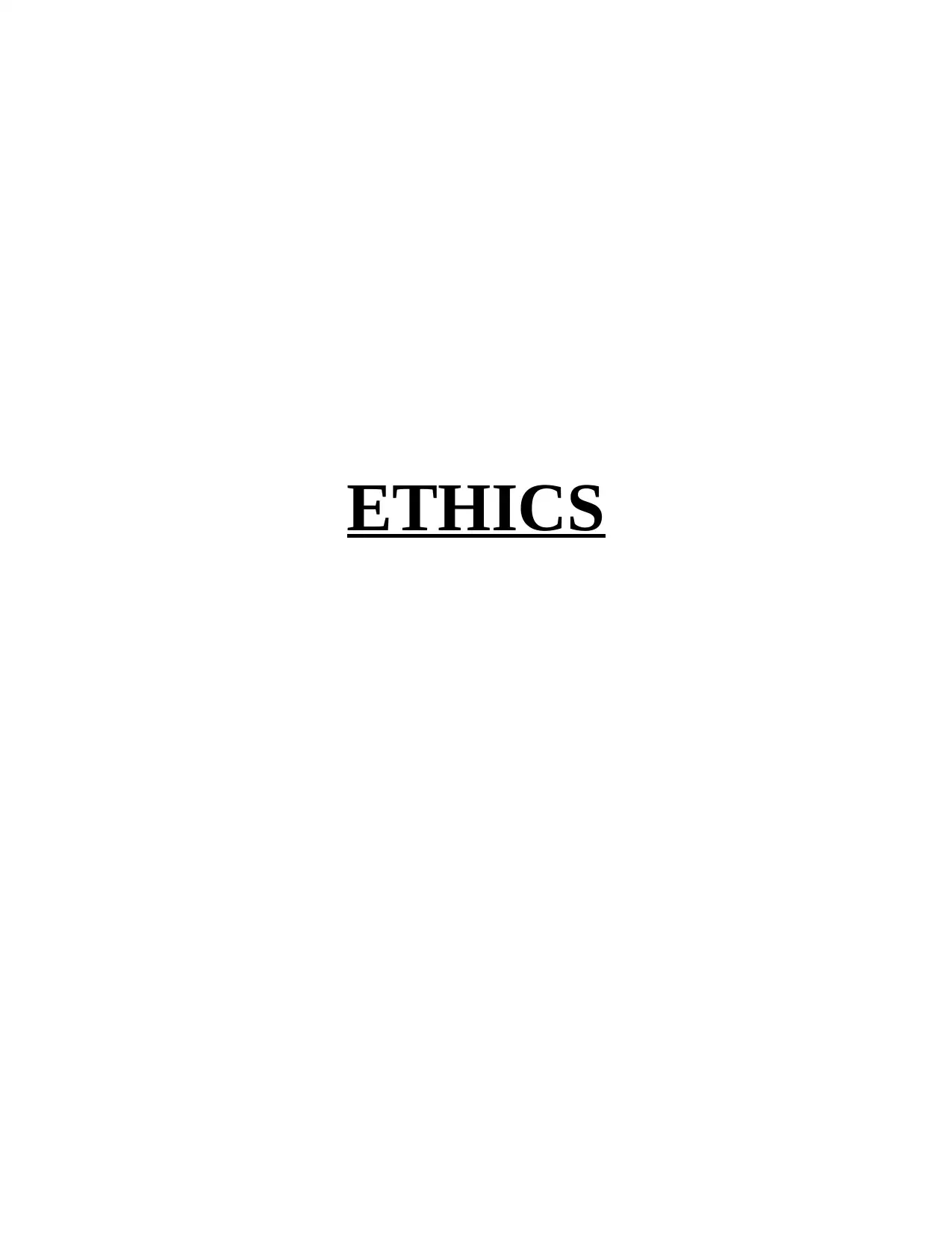
ETHICS
Paraphrase This Document
Need a fresh take? Get an instant paraphrase of this document with our AI Paraphraser
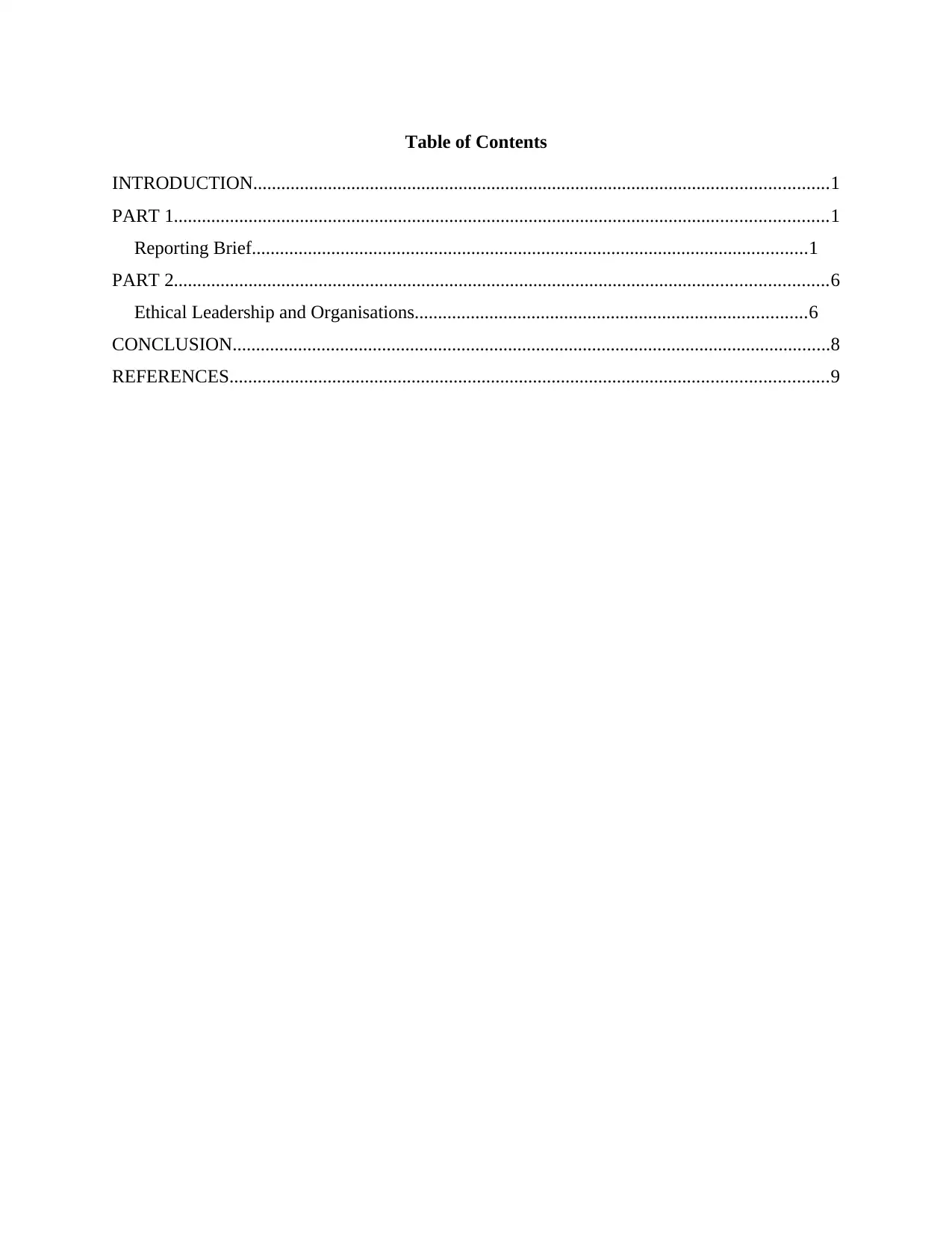
Table of Contents
INTRODUCTION...........................................................................................................................1
PART 1............................................................................................................................................1
Reporting Brief.......................................................................................................................1
PART 2............................................................................................................................................6
Ethical Leadership and Organisations....................................................................................6
CONCLUSION................................................................................................................................8
REFERENCES................................................................................................................................9
INTRODUCTION...........................................................................................................................1
PART 1............................................................................................................................................1
Reporting Brief.......................................................................................................................1
PART 2............................................................................................................................................6
Ethical Leadership and Organisations....................................................................................6
CONCLUSION................................................................................................................................8
REFERENCES................................................................................................................................9
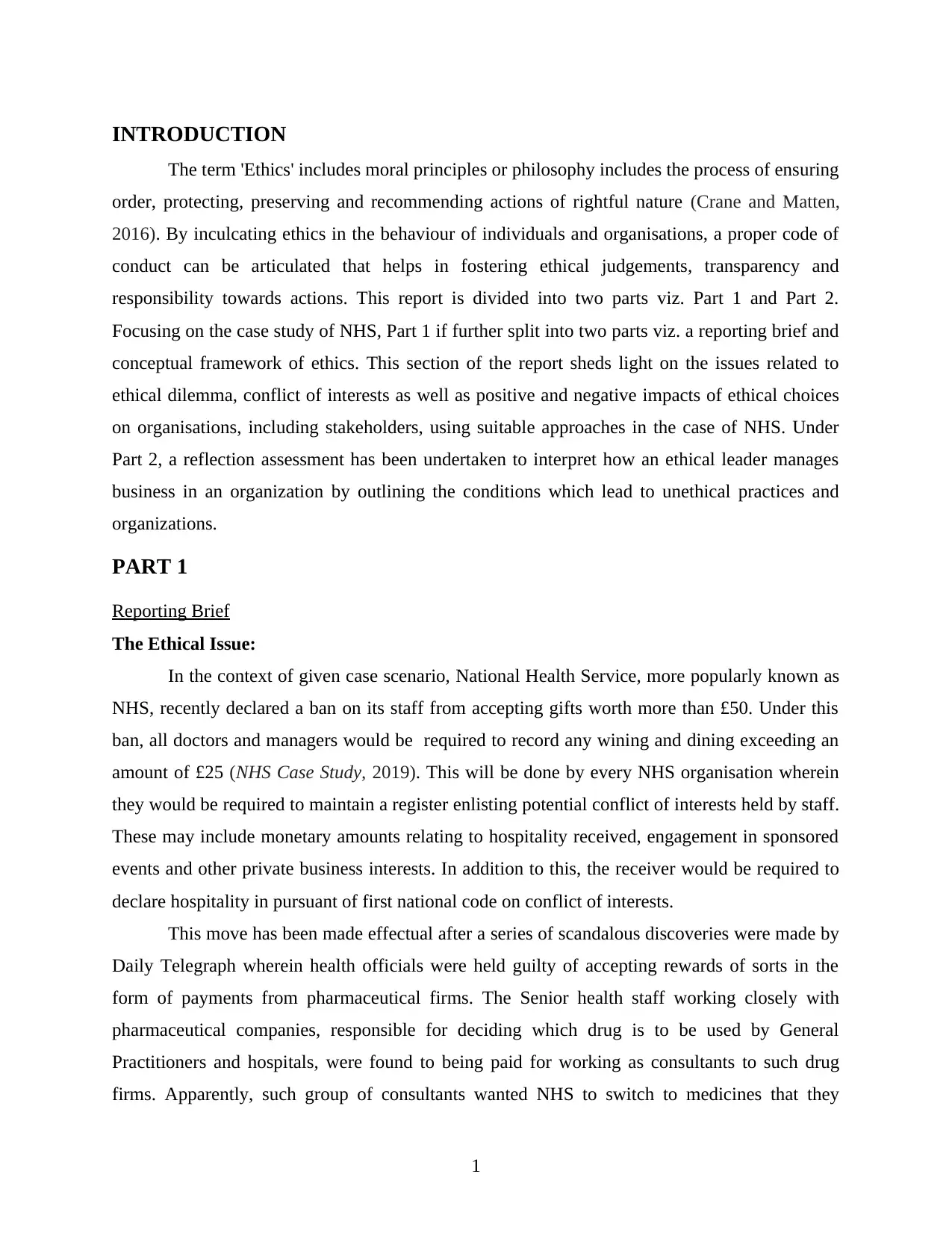
INTRODUCTION
The term 'Ethics' includes moral principles or philosophy includes the process of ensuring
order, protecting, preserving and recommending actions of rightful nature (Crane and Matten,
2016). By inculcating ethics in the behaviour of individuals and organisations, a proper code of
conduct can be articulated that helps in fostering ethical judgements, transparency and
responsibility towards actions. This report is divided into two parts viz. Part 1 and Part 2.
Focusing on the case study of NHS, Part 1 if further split into two parts viz. a reporting brief and
conceptual framework of ethics. This section of the report sheds light on the issues related to
ethical dilemma, conflict of interests as well as positive and negative impacts of ethical choices
on organisations, including stakeholders, using suitable approaches in the case of NHS. Under
Part 2, a reflection assessment has been undertaken to interpret how an ethical leader manages
business in an organization by outlining the conditions which lead to unethical practices and
organizations.
PART 1
Reporting Brief
The Ethical Issue:
In the context of given case scenario, National Health Service, more popularly known as
NHS, recently declared a ban on its staff from accepting gifts worth more than £50. Under this
ban, all doctors and managers would be required to record any wining and dining exceeding an
amount of £25 (NHS Case Study, 2019). This will be done by every NHS organisation wherein
they would be required to maintain a register enlisting potential conflict of interests held by staff.
These may include monetary amounts relating to hospitality received, engagement in sponsored
events and other private business interests. In addition to this, the receiver would be required to
declare hospitality in pursuant of first national code on conflict of interests.
This move has been made effectual after a series of scandalous discoveries were made by
Daily Telegraph wherein health officials were held guilty of accepting rewards of sorts in the
form of payments from pharmaceutical firms. The Senior health staff working closely with
pharmaceutical companies, responsible for deciding which drug is to be used by General
Practitioners and hospitals, were found to being paid for working as consultants to such drug
firms. Apparently, such group of consultants wanted NHS to switch to medicines that they
1
The term 'Ethics' includes moral principles or philosophy includes the process of ensuring
order, protecting, preserving and recommending actions of rightful nature (Crane and Matten,
2016). By inculcating ethics in the behaviour of individuals and organisations, a proper code of
conduct can be articulated that helps in fostering ethical judgements, transparency and
responsibility towards actions. This report is divided into two parts viz. Part 1 and Part 2.
Focusing on the case study of NHS, Part 1 if further split into two parts viz. a reporting brief and
conceptual framework of ethics. This section of the report sheds light on the issues related to
ethical dilemma, conflict of interests as well as positive and negative impacts of ethical choices
on organisations, including stakeholders, using suitable approaches in the case of NHS. Under
Part 2, a reflection assessment has been undertaken to interpret how an ethical leader manages
business in an organization by outlining the conditions which lead to unethical practices and
organizations.
PART 1
Reporting Brief
The Ethical Issue:
In the context of given case scenario, National Health Service, more popularly known as
NHS, recently declared a ban on its staff from accepting gifts worth more than £50. Under this
ban, all doctors and managers would be required to record any wining and dining exceeding an
amount of £25 (NHS Case Study, 2019). This will be done by every NHS organisation wherein
they would be required to maintain a register enlisting potential conflict of interests held by staff.
These may include monetary amounts relating to hospitality received, engagement in sponsored
events and other private business interests. In addition to this, the receiver would be required to
declare hospitality in pursuant of first national code on conflict of interests.
This move has been made effectual after a series of scandalous discoveries were made by
Daily Telegraph wherein health officials were held guilty of accepting rewards of sorts in the
form of payments from pharmaceutical firms. The Senior health staff working closely with
pharmaceutical companies, responsible for deciding which drug is to be used by General
Practitioners and hospitals, were found to being paid for working as consultants to such drug
firms. Apparently, such group of consultants wanted NHS to switch to medicines that they
1
⊘ This is a preview!⊘
Do you want full access?
Subscribe today to unlock all pages.

Trusted by 1+ million students worldwide
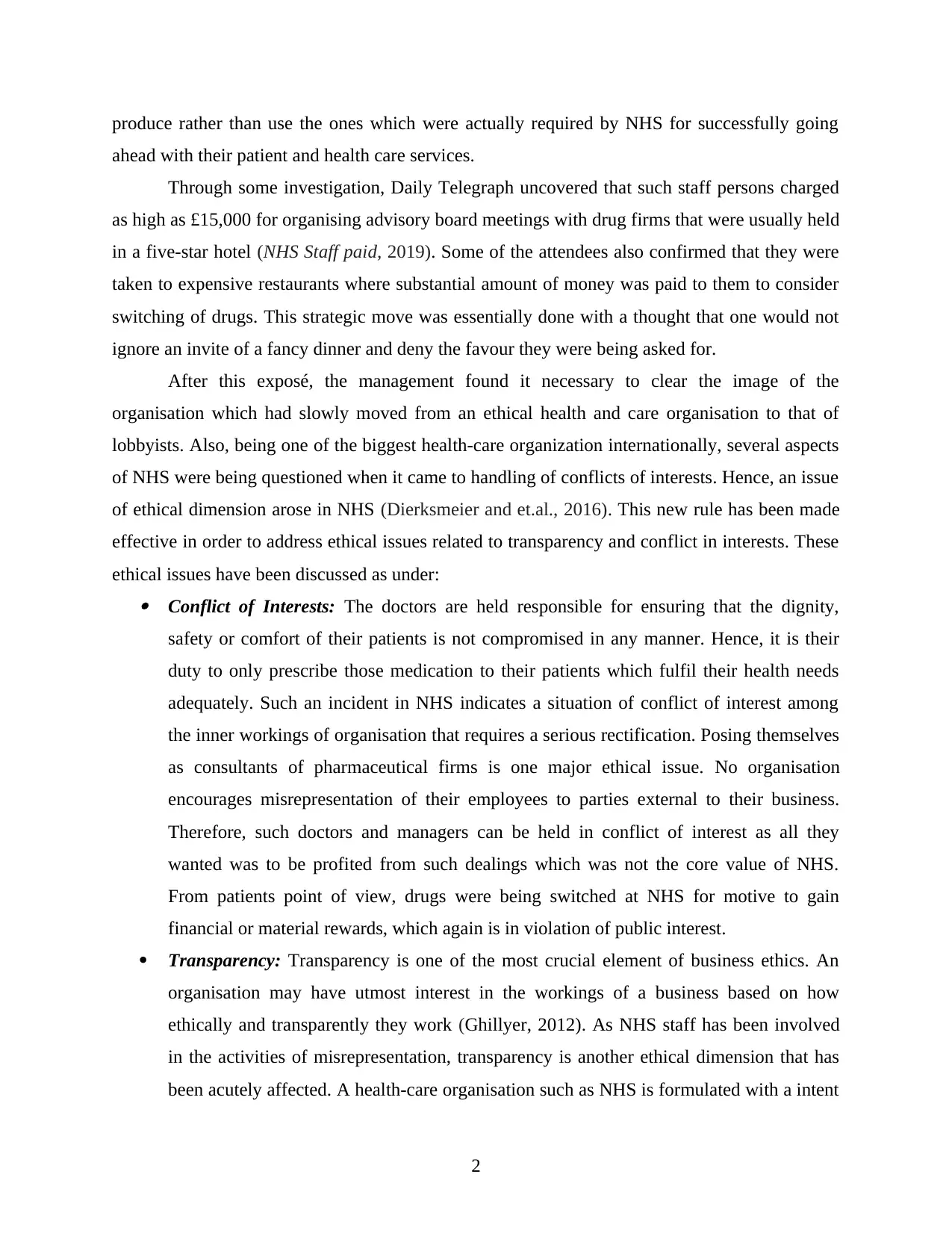
produce rather than use the ones which were actually required by NHS for successfully going
ahead with their patient and health care services.
Through some investigation, Daily Telegraph uncovered that such staff persons charged
as high as £15,000 for organising advisory board meetings with drug firms that were usually held
in a five-star hotel (NHS Staff paid, 2019). Some of the attendees also confirmed that they were
taken to expensive restaurants where substantial amount of money was paid to them to consider
switching of drugs. This strategic move was essentially done with a thought that one would not
ignore an invite of a fancy dinner and deny the favour they were being asked for.
After this exposé, the management found it necessary to clear the image of the
organisation which had slowly moved from an ethical health and care organisation to that of
lobbyists. Also, being one of the biggest health-care organization internationally, several aspects
of NHS were being questioned when it came to handling of conflicts of interests. Hence, an issue
of ethical dimension arose in NHS (Dierksmeier and et.al., 2016). This new rule has been made
effective in order to address ethical issues related to transparency and conflict in interests. These
ethical issues have been discussed as under: Conflict of Interests: The doctors are held responsible for ensuring that the dignity,
safety or comfort of their patients is not compromised in any manner. Hence, it is their
duty to only prescribe those medication to their patients which fulfil their health needs
adequately. Such an incident in NHS indicates a situation of conflict of interest among
the inner workings of organisation that requires a serious rectification. Posing themselves
as consultants of pharmaceutical firms is one major ethical issue. No organisation
encourages misrepresentation of their employees to parties external to their business.
Therefore, such doctors and managers can be held in conflict of interest as all they
wanted was to be profited from such dealings which was not the core value of NHS.
From patients point of view, drugs were being switched at NHS for motive to gain
financial or material rewards, which again is in violation of public interest.
Transparency: Transparency is one of the most crucial element of business ethics. An
organisation may have utmost interest in the workings of a business based on how
ethically and transparently they work (Ghillyer, 2012). As NHS staff has been involved
in the activities of misrepresentation, transparency is another ethical dimension that has
been acutely affected. A health-care organisation such as NHS is formulated with a intent
2
ahead with their patient and health care services.
Through some investigation, Daily Telegraph uncovered that such staff persons charged
as high as £15,000 for organising advisory board meetings with drug firms that were usually held
in a five-star hotel (NHS Staff paid, 2019). Some of the attendees also confirmed that they were
taken to expensive restaurants where substantial amount of money was paid to them to consider
switching of drugs. This strategic move was essentially done with a thought that one would not
ignore an invite of a fancy dinner and deny the favour they were being asked for.
After this exposé, the management found it necessary to clear the image of the
organisation which had slowly moved from an ethical health and care organisation to that of
lobbyists. Also, being one of the biggest health-care organization internationally, several aspects
of NHS were being questioned when it came to handling of conflicts of interests. Hence, an issue
of ethical dimension arose in NHS (Dierksmeier and et.al., 2016). This new rule has been made
effective in order to address ethical issues related to transparency and conflict in interests. These
ethical issues have been discussed as under: Conflict of Interests: The doctors are held responsible for ensuring that the dignity,
safety or comfort of their patients is not compromised in any manner. Hence, it is their
duty to only prescribe those medication to their patients which fulfil their health needs
adequately. Such an incident in NHS indicates a situation of conflict of interest among
the inner workings of organisation that requires a serious rectification. Posing themselves
as consultants of pharmaceutical firms is one major ethical issue. No organisation
encourages misrepresentation of their employees to parties external to their business.
Therefore, such doctors and managers can be held in conflict of interest as all they
wanted was to be profited from such dealings which was not the core value of NHS.
From patients point of view, drugs were being switched at NHS for motive to gain
financial or material rewards, which again is in violation of public interest.
Transparency: Transparency is one of the most crucial element of business ethics. An
organisation may have utmost interest in the workings of a business based on how
ethically and transparently they work (Ghillyer, 2012). As NHS staff has been involved
in the activities of misrepresentation, transparency is another ethical dimension that has
been acutely affected. A health-care organisation such as NHS is formulated with a intent
2
Paraphrase This Document
Need a fresh take? Get an instant paraphrase of this document with our AI Paraphraser
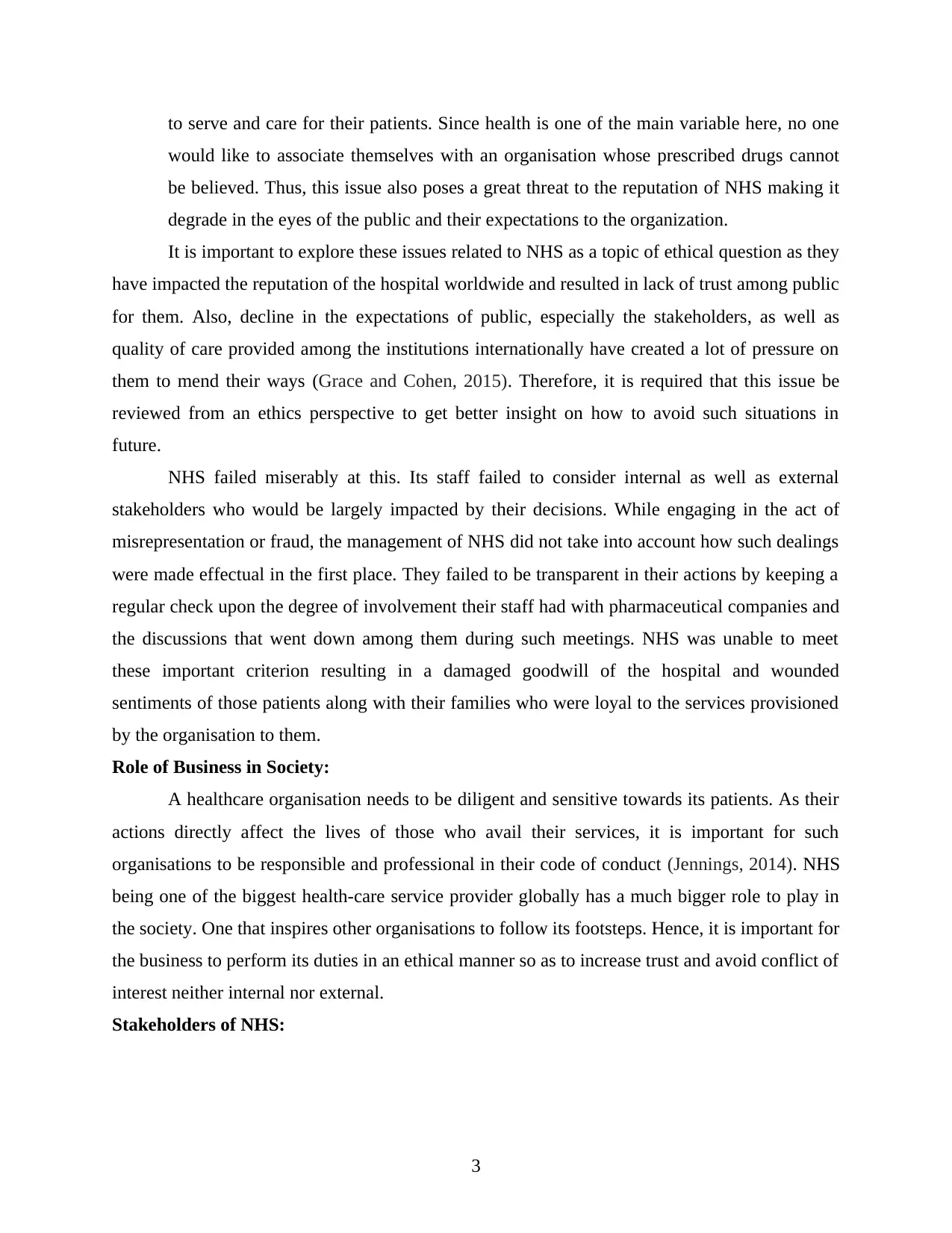
to serve and care for their patients. Since health is one of the main variable here, no one
would like to associate themselves with an organisation whose prescribed drugs cannot
be believed. Thus, this issue also poses a great threat to the reputation of NHS making it
degrade in the eyes of the public and their expectations to the organization.
It is important to explore these issues related to NHS as a topic of ethical question as they
have impacted the reputation of the hospital worldwide and resulted in lack of trust among public
for them. Also, decline in the expectations of public, especially the stakeholders, as well as
quality of care provided among the institutions internationally have created a lot of pressure on
them to mend their ways (Grace and Cohen, 2015). Therefore, it is required that this issue be
reviewed from an ethics perspective to get better insight on how to avoid such situations in
future.
NHS failed miserably at this. Its staff failed to consider internal as well as external
stakeholders who would be largely impacted by their decisions. While engaging in the act of
misrepresentation or fraud, the management of NHS did not take into account how such dealings
were made effectual in the first place. They failed to be transparent in their actions by keeping a
regular check upon the degree of involvement their staff had with pharmaceutical companies and
the discussions that went down among them during such meetings. NHS was unable to meet
these important criterion resulting in a damaged goodwill of the hospital and wounded
sentiments of those patients along with their families who were loyal to the services provisioned
by the organisation to them.
Role of Business in Society:
A healthcare organisation needs to be diligent and sensitive towards its patients. As their
actions directly affect the lives of those who avail their services, it is important for such
organisations to be responsible and professional in their code of conduct (Jennings, 2014). NHS
being one of the biggest health-care service provider globally has a much bigger role to play in
the society. One that inspires other organisations to follow its footsteps. Hence, it is important for
the business to perform its duties in an ethical manner so as to increase trust and avoid conflict of
interest neither internal nor external.
Stakeholders of NHS:
3
would like to associate themselves with an organisation whose prescribed drugs cannot
be believed. Thus, this issue also poses a great threat to the reputation of NHS making it
degrade in the eyes of the public and their expectations to the organization.
It is important to explore these issues related to NHS as a topic of ethical question as they
have impacted the reputation of the hospital worldwide and resulted in lack of trust among public
for them. Also, decline in the expectations of public, especially the stakeholders, as well as
quality of care provided among the institutions internationally have created a lot of pressure on
them to mend their ways (Grace and Cohen, 2015). Therefore, it is required that this issue be
reviewed from an ethics perspective to get better insight on how to avoid such situations in
future.
NHS failed miserably at this. Its staff failed to consider internal as well as external
stakeholders who would be largely impacted by their decisions. While engaging in the act of
misrepresentation or fraud, the management of NHS did not take into account how such dealings
were made effectual in the first place. They failed to be transparent in their actions by keeping a
regular check upon the degree of involvement their staff had with pharmaceutical companies and
the discussions that went down among them during such meetings. NHS was unable to meet
these important criterion resulting in a damaged goodwill of the hospital and wounded
sentiments of those patients along with their families who were loyal to the services provisioned
by the organisation to them.
Role of Business in Society:
A healthcare organisation needs to be diligent and sensitive towards its patients. As their
actions directly affect the lives of those who avail their services, it is important for such
organisations to be responsible and professional in their code of conduct (Jennings, 2014). NHS
being one of the biggest health-care service provider globally has a much bigger role to play in
the society. One that inspires other organisations to follow its footsteps. Hence, it is important for
the business to perform its duties in an ethical manner so as to increase trust and avoid conflict of
interest neither internal nor external.
Stakeholders of NHS:
3
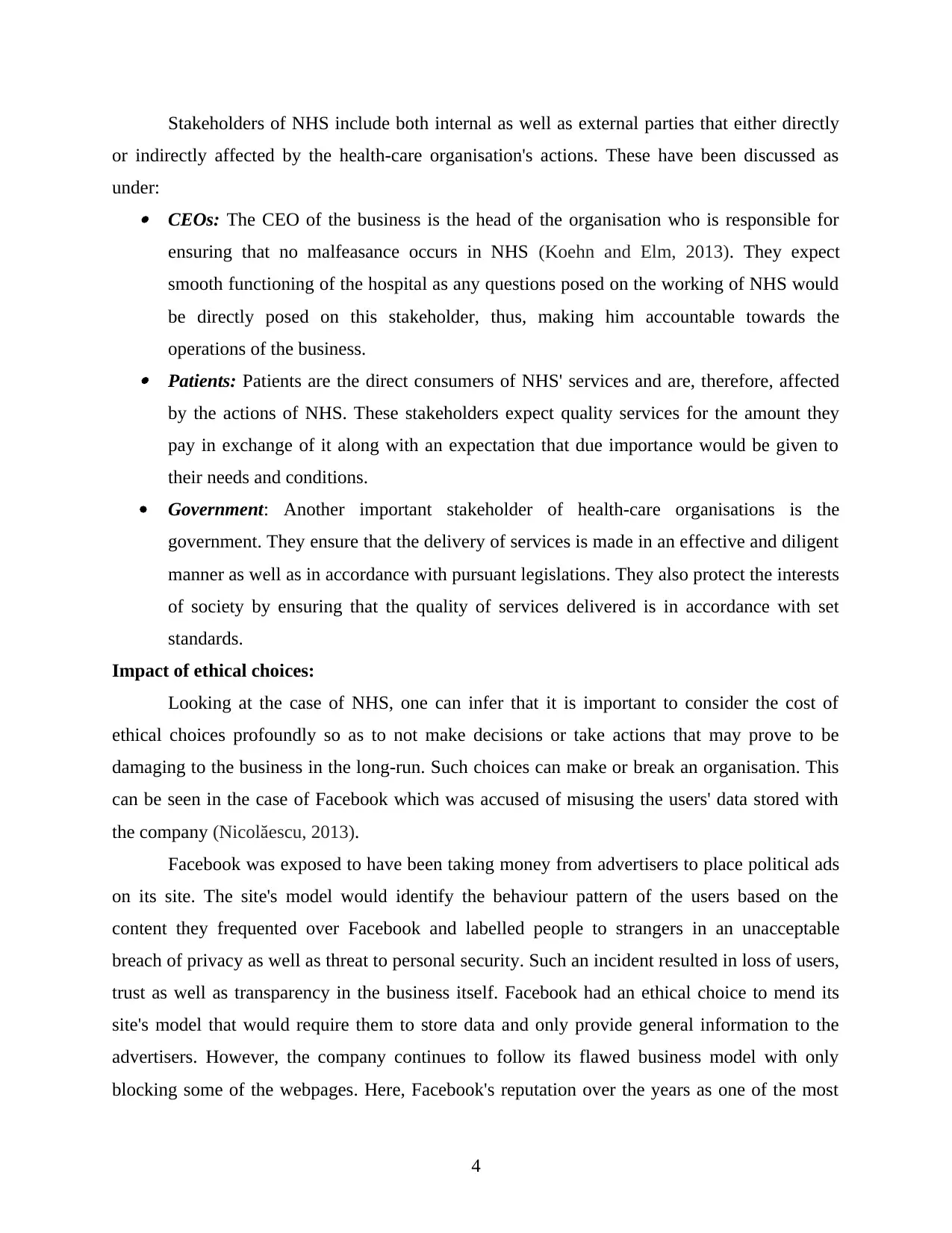
Stakeholders of NHS include both internal as well as external parties that either directly
or indirectly affected by the health-care organisation's actions. These have been discussed as
under: CEOs: The CEO of the business is the head of the organisation who is responsible for
ensuring that no malfeasance occurs in NHS (Koehn and Elm, 2013). They expect
smooth functioning of the hospital as any questions posed on the working of NHS would
be directly posed on this stakeholder, thus, making him accountable towards the
operations of the business. Patients: Patients are the direct consumers of NHS' services and are, therefore, affected
by the actions of NHS. These stakeholders expect quality services for the amount they
pay in exchange of it along with an expectation that due importance would be given to
their needs and conditions.
Government: Another important stakeholder of health-care organisations is the
government. They ensure that the delivery of services is made in an effective and diligent
manner as well as in accordance with pursuant legislations. They also protect the interests
of society by ensuring that the quality of services delivered is in accordance with set
standards.
Impact of ethical choices:
Looking at the case of NHS, one can infer that it is important to consider the cost of
ethical choices profoundly so as to not make decisions or take actions that may prove to be
damaging to the business in the long-run. Such choices can make or break an organisation. This
can be seen in the case of Facebook which was accused of misusing the users' data stored with
the company (Nicolăescu, 2013).
Facebook was exposed to have been taking money from advertisers to place political ads
on its site. The site's model would identify the behaviour pattern of the users based on the
content they frequented over Facebook and labelled people to strangers in an unacceptable
breach of privacy as well as threat to personal security. Such an incident resulted in loss of users,
trust as well as transparency in the business itself. Facebook had an ethical choice to mend its
site's model that would require them to store data and only provide general information to the
advertisers. However, the company continues to follow its flawed business model with only
blocking some of the webpages. Here, Facebook's reputation over the years as one of the most
4
or indirectly affected by the health-care organisation's actions. These have been discussed as
under: CEOs: The CEO of the business is the head of the organisation who is responsible for
ensuring that no malfeasance occurs in NHS (Koehn and Elm, 2013). They expect
smooth functioning of the hospital as any questions posed on the working of NHS would
be directly posed on this stakeholder, thus, making him accountable towards the
operations of the business. Patients: Patients are the direct consumers of NHS' services and are, therefore, affected
by the actions of NHS. These stakeholders expect quality services for the amount they
pay in exchange of it along with an expectation that due importance would be given to
their needs and conditions.
Government: Another important stakeholder of health-care organisations is the
government. They ensure that the delivery of services is made in an effective and diligent
manner as well as in accordance with pursuant legislations. They also protect the interests
of society by ensuring that the quality of services delivered is in accordance with set
standards.
Impact of ethical choices:
Looking at the case of NHS, one can infer that it is important to consider the cost of
ethical choices profoundly so as to not make decisions or take actions that may prove to be
damaging to the business in the long-run. Such choices can make or break an organisation. This
can be seen in the case of Facebook which was accused of misusing the users' data stored with
the company (Nicolăescu, 2013).
Facebook was exposed to have been taking money from advertisers to place political ads
on its site. The site's model would identify the behaviour pattern of the users based on the
content they frequented over Facebook and labelled people to strangers in an unacceptable
breach of privacy as well as threat to personal security. Such an incident resulted in loss of users,
trust as well as transparency in the business itself. Facebook had an ethical choice to mend its
site's model that would require them to store data and only provide general information to the
advertisers. However, the company continues to follow its flawed business model with only
blocking some of the webpages. Here, Facebook's reputation over the years as one of the most
4
⊘ This is a preview!⊘
Do you want full access?
Subscribe today to unlock all pages.

Trusted by 1+ million students worldwide
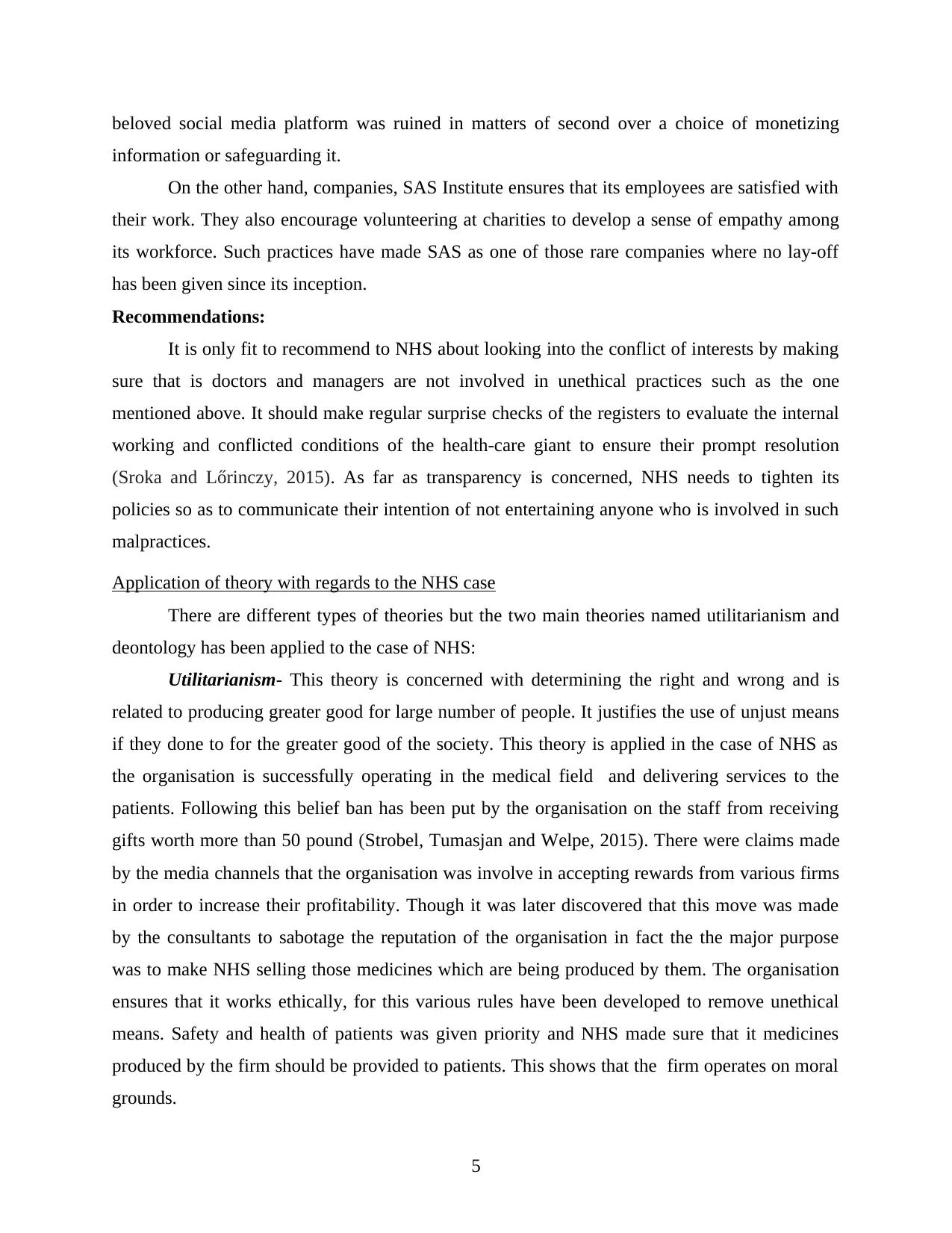
beloved social media platform was ruined in matters of second over a choice of monetizing
information or safeguarding it.
On the other hand, companies, SAS Institute ensures that its employees are satisfied with
their work. They also encourage volunteering at charities to develop a sense of empathy among
its workforce. Such practices have made SAS as one of those rare companies where no lay-off
has been given since its inception.
Recommendations:
It is only fit to recommend to NHS about looking into the conflict of interests by making
sure that is doctors and managers are not involved in unethical practices such as the one
mentioned above. It should make regular surprise checks of the registers to evaluate the internal
working and conflicted conditions of the health-care giant to ensure their prompt resolution
(Sroka and Lőrinczy, 2015). As far as transparency is concerned, NHS needs to tighten its
policies so as to communicate their intention of not entertaining anyone who is involved in such
malpractices.
Application of theory with regards to the NHS case
There are different types of theories but the two main theories named utilitarianism and
deontology has been applied to the case of NHS:
Utilitarianism- This theory is concerned with determining the right and wrong and is
related to producing greater good for large number of people. It justifies the use of unjust means
if they done to for the greater good of the society. This theory is applied in the case of NHS as
the organisation is successfully operating in the medical field and delivering services to the
patients. Following this belief ban has been put by the organisation on the staff from receiving
gifts worth more than 50 pound (Strobel, Tumasjan and Welpe, 2015). There were claims made
by the media channels that the organisation was involve in accepting rewards from various firms
in order to increase their profitability. Though it was later discovered that this move was made
by the consultants to sabotage the reputation of the organisation in fact the the major purpose
was to make NHS selling those medicines which are being produced by them. The organisation
ensures that it works ethically, for this various rules have been developed to remove unethical
means. Safety and health of patients was given priority and NHS made sure that it medicines
produced by the firm should be provided to patients. This shows that the firm operates on moral
grounds.
5
information or safeguarding it.
On the other hand, companies, SAS Institute ensures that its employees are satisfied with
their work. They also encourage volunteering at charities to develop a sense of empathy among
its workforce. Such practices have made SAS as one of those rare companies where no lay-off
has been given since its inception.
Recommendations:
It is only fit to recommend to NHS about looking into the conflict of interests by making
sure that is doctors and managers are not involved in unethical practices such as the one
mentioned above. It should make regular surprise checks of the registers to evaluate the internal
working and conflicted conditions of the health-care giant to ensure their prompt resolution
(Sroka and Lőrinczy, 2015). As far as transparency is concerned, NHS needs to tighten its
policies so as to communicate their intention of not entertaining anyone who is involved in such
malpractices.
Application of theory with regards to the NHS case
There are different types of theories but the two main theories named utilitarianism and
deontology has been applied to the case of NHS:
Utilitarianism- This theory is concerned with determining the right and wrong and is
related to producing greater good for large number of people. It justifies the use of unjust means
if they done to for the greater good of the society. This theory is applied in the case of NHS as
the organisation is successfully operating in the medical field and delivering services to the
patients. Following this belief ban has been put by the organisation on the staff from receiving
gifts worth more than 50 pound (Strobel, Tumasjan and Welpe, 2015). There were claims made
by the media channels that the organisation was involve in accepting rewards from various firms
in order to increase their profitability. Though it was later discovered that this move was made
by the consultants to sabotage the reputation of the organisation in fact the the major purpose
was to make NHS selling those medicines which are being produced by them. The organisation
ensures that it works ethically, for this various rules have been developed to remove unethical
means. Safety and health of patients was given priority and NHS made sure that it medicines
produced by the firm should be provided to patients. This shows that the firm operates on moral
grounds.
5
Paraphrase This Document
Need a fresh take? Get an instant paraphrase of this document with our AI Paraphraser
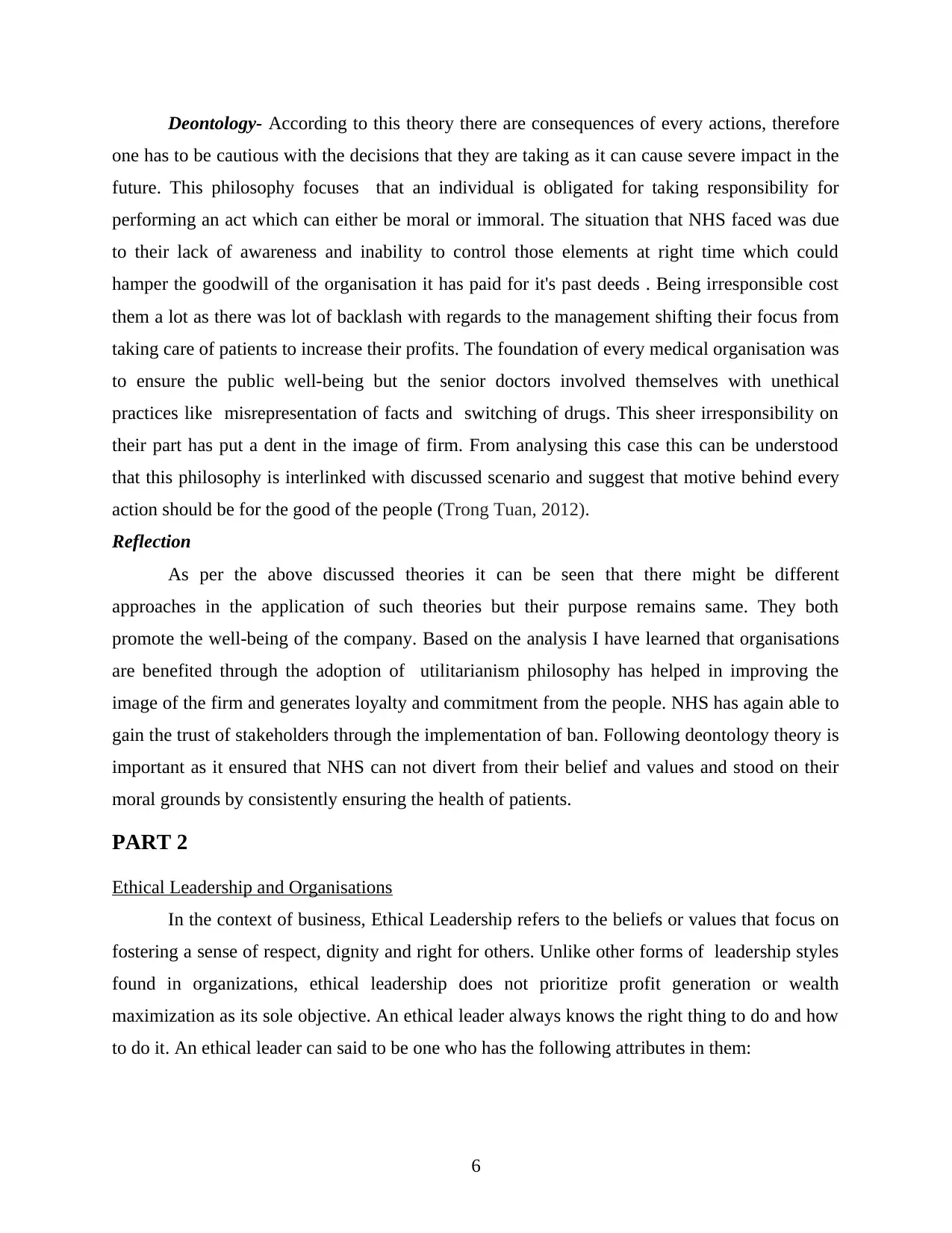
Deontology- According to this theory there are consequences of every actions, therefore
one has to be cautious with the decisions that they are taking as it can cause severe impact in the
future. This philosophy focuses that an individual is obligated for taking responsibility for
performing an act which can either be moral or immoral. The situation that NHS faced was due
to their lack of awareness and inability to control those elements at right time which could
hamper the goodwill of the organisation it has paid for it's past deeds . Being irresponsible cost
them a lot as there was lot of backlash with regards to the management shifting their focus from
taking care of patients to increase their profits. The foundation of every medical organisation was
to ensure the public well-being but the senior doctors involved themselves with unethical
practices like misrepresentation of facts and switching of drugs. This sheer irresponsibility on
their part has put a dent in the image of firm. From analysing this case this can be understood
that this philosophy is interlinked with discussed scenario and suggest that motive behind every
action should be for the good of the people (Trong Tuan, 2012).
Reflection
As per the above discussed theories it can be seen that there might be different
approaches in the application of such theories but their purpose remains same. They both
promote the well-being of the company. Based on the analysis I have learned that organisations
are benefited through the adoption of utilitarianism philosophy has helped in improving the
image of the firm and generates loyalty and commitment from the people. NHS has again able to
gain the trust of stakeholders through the implementation of ban. Following deontology theory is
important as it ensured that NHS can not divert from their belief and values and stood on their
moral grounds by consistently ensuring the health of patients.
PART 2
Ethical Leadership and Organisations
In the context of business, Ethical Leadership refers to the beliefs or values that focus on
fostering a sense of respect, dignity and right for others. Unlike other forms of leadership styles
found in organizations, ethical leadership does not prioritize profit generation or wealth
maximization as its sole objective. An ethical leader always knows the right thing to do and how
to do it. An ethical leader can said to be one who has the following attributes in them:
6
one has to be cautious with the decisions that they are taking as it can cause severe impact in the
future. This philosophy focuses that an individual is obligated for taking responsibility for
performing an act which can either be moral or immoral. The situation that NHS faced was due
to their lack of awareness and inability to control those elements at right time which could
hamper the goodwill of the organisation it has paid for it's past deeds . Being irresponsible cost
them a lot as there was lot of backlash with regards to the management shifting their focus from
taking care of patients to increase their profits. The foundation of every medical organisation was
to ensure the public well-being but the senior doctors involved themselves with unethical
practices like misrepresentation of facts and switching of drugs. This sheer irresponsibility on
their part has put a dent in the image of firm. From analysing this case this can be understood
that this philosophy is interlinked with discussed scenario and suggest that motive behind every
action should be for the good of the people (Trong Tuan, 2012).
Reflection
As per the above discussed theories it can be seen that there might be different
approaches in the application of such theories but their purpose remains same. They both
promote the well-being of the company. Based on the analysis I have learned that organisations
are benefited through the adoption of utilitarianism philosophy has helped in improving the
image of the firm and generates loyalty and commitment from the people. NHS has again able to
gain the trust of stakeholders through the implementation of ban. Following deontology theory is
important as it ensured that NHS can not divert from their belief and values and stood on their
moral grounds by consistently ensuring the health of patients.
PART 2
Ethical Leadership and Organisations
In the context of business, Ethical Leadership refers to the beliefs or values that focus on
fostering a sense of respect, dignity and right for others. Unlike other forms of leadership styles
found in organizations, ethical leadership does not prioritize profit generation or wealth
maximization as its sole objective. An ethical leader always knows the right thing to do and how
to do it. An ethical leader can said to be one who has the following attributes in them:
6
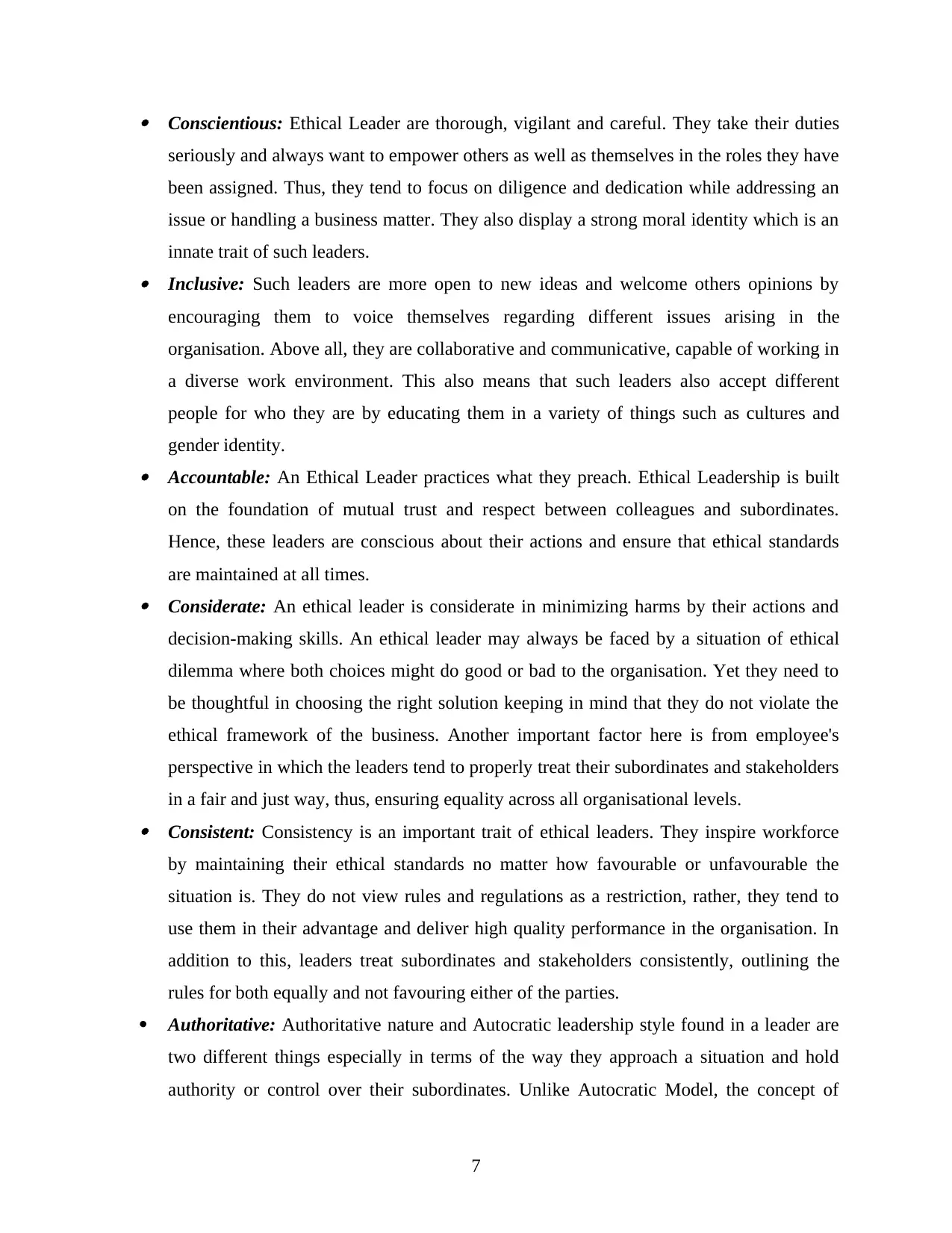
Conscientious: Ethical Leader are thorough, vigilant and careful. They take their duties
seriously and always want to empower others as well as themselves in the roles they have
been assigned. Thus, they tend to focus on diligence and dedication while addressing an
issue or handling a business matter. They also display a strong moral identity which is an
innate trait of such leaders. Inclusive: Such leaders are more open to new ideas and welcome others opinions by
encouraging them to voice themselves regarding different issues arising in the
organisation. Above all, they are collaborative and communicative, capable of working in
a diverse work environment. This also means that such leaders also accept different
people for who they are by educating them in a variety of things such as cultures and
gender identity. Accountable: An Ethical Leader practices what they preach. Ethical Leadership is built
on the foundation of mutual trust and respect between colleagues and subordinates.
Hence, these leaders are conscious about their actions and ensure that ethical standards
are maintained at all times. Considerate: An ethical leader is considerate in minimizing harms by their actions and
decision-making skills. An ethical leader may always be faced by a situation of ethical
dilemma where both choices might do good or bad to the organisation. Yet they need to
be thoughtful in choosing the right solution keeping in mind that they do not violate the
ethical framework of the business. Another important factor here is from employee's
perspective in which the leaders tend to properly treat their subordinates and stakeholders
in a fair and just way, thus, ensuring equality across all organisational levels. Consistent: Consistency is an important trait of ethical leaders. They inspire workforce
by maintaining their ethical standards no matter how favourable or unfavourable the
situation is. They do not view rules and regulations as a restriction, rather, they tend to
use them in their advantage and deliver high quality performance in the organisation. In
addition to this, leaders treat subordinates and stakeholders consistently, outlining the
rules for both equally and not favouring either of the parties.
Authoritative: Authoritative nature and Autocratic leadership style found in a leader are
two different things especially in terms of the way they approach a situation and hold
authority or control over their subordinates. Unlike Autocratic Model, the concept of
7
seriously and always want to empower others as well as themselves in the roles they have
been assigned. Thus, they tend to focus on diligence and dedication while addressing an
issue or handling a business matter. They also display a strong moral identity which is an
innate trait of such leaders. Inclusive: Such leaders are more open to new ideas and welcome others opinions by
encouraging them to voice themselves regarding different issues arising in the
organisation. Above all, they are collaborative and communicative, capable of working in
a diverse work environment. This also means that such leaders also accept different
people for who they are by educating them in a variety of things such as cultures and
gender identity. Accountable: An Ethical Leader practices what they preach. Ethical Leadership is built
on the foundation of mutual trust and respect between colleagues and subordinates.
Hence, these leaders are conscious about their actions and ensure that ethical standards
are maintained at all times. Considerate: An ethical leader is considerate in minimizing harms by their actions and
decision-making skills. An ethical leader may always be faced by a situation of ethical
dilemma where both choices might do good or bad to the organisation. Yet they need to
be thoughtful in choosing the right solution keeping in mind that they do not violate the
ethical framework of the business. Another important factor here is from employee's
perspective in which the leaders tend to properly treat their subordinates and stakeholders
in a fair and just way, thus, ensuring equality across all organisational levels. Consistent: Consistency is an important trait of ethical leaders. They inspire workforce
by maintaining their ethical standards no matter how favourable or unfavourable the
situation is. They do not view rules and regulations as a restriction, rather, they tend to
use them in their advantage and deliver high quality performance in the organisation. In
addition to this, leaders treat subordinates and stakeholders consistently, outlining the
rules for both equally and not favouring either of the parties.
Authoritative: Authoritative nature and Autocratic leadership style found in a leader are
two different things especially in terms of the way they approach a situation and hold
authority or control over their subordinates. Unlike Autocratic Model, the concept of
7
⊘ This is a preview!⊘
Do you want full access?
Subscribe today to unlock all pages.

Trusted by 1+ million students worldwide
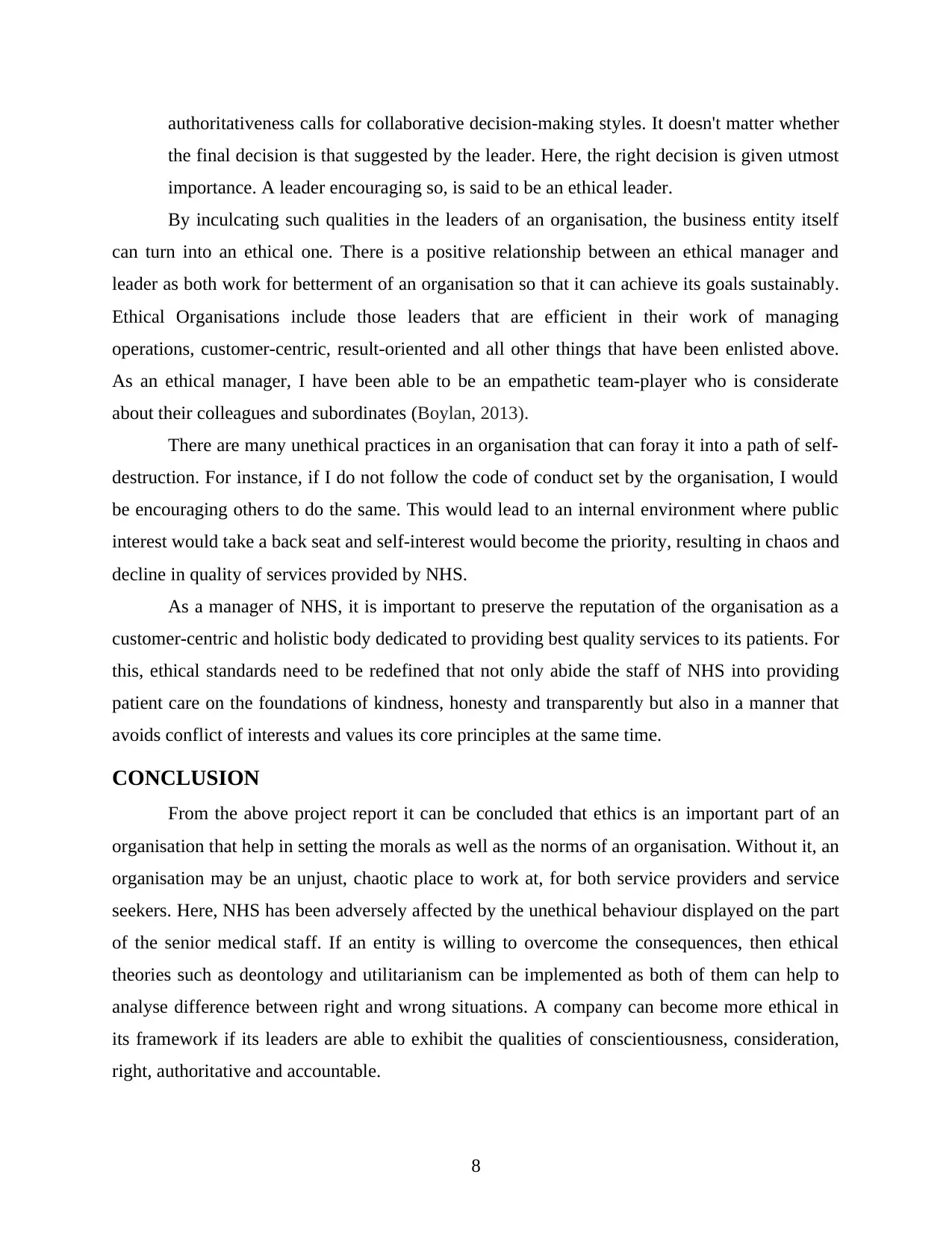
authoritativeness calls for collaborative decision-making styles. It doesn't matter whether
the final decision is that suggested by the leader. Here, the right decision is given utmost
importance. A leader encouraging so, is said to be an ethical leader.
By inculcating such qualities in the leaders of an organisation, the business entity itself
can turn into an ethical one. There is a positive relationship between an ethical manager and
leader as both work for betterment of an organisation so that it can achieve its goals sustainably.
Ethical Organisations include those leaders that are efficient in their work of managing
operations, customer-centric, result-oriented and all other things that have been enlisted above.
As an ethical manager, I have been able to be an empathetic team-player who is considerate
about their colleagues and subordinates (Boylan, 2013).
There are many unethical practices in an organisation that can foray it into a path of self-
destruction. For instance, if I do not follow the code of conduct set by the organisation, I would
be encouraging others to do the same. This would lead to an internal environment where public
interest would take a back seat and self-interest would become the priority, resulting in chaos and
decline in quality of services provided by NHS.
As a manager of NHS, it is important to preserve the reputation of the organisation as a
customer-centric and holistic body dedicated to providing best quality services to its patients. For
this, ethical standards need to be redefined that not only abide the staff of NHS into providing
patient care on the foundations of kindness, honesty and transparently but also in a manner that
avoids conflict of interests and values its core principles at the same time.
CONCLUSION
From the above project report it can be concluded that ethics is an important part of an
organisation that help in setting the morals as well as the norms of an organisation. Without it, an
organisation may be an unjust, chaotic place to work at, for both service providers and service
seekers. Here, NHS has been adversely affected by the unethical behaviour displayed on the part
of the senior medical staff. If an entity is willing to overcome the consequences, then ethical
theories such as deontology and utilitarianism can be implemented as both of them can help to
analyse difference between right and wrong situations. A company can become more ethical in
its framework if its leaders are able to exhibit the qualities of conscientiousness, consideration,
right, authoritative and accountable.
8
the final decision is that suggested by the leader. Here, the right decision is given utmost
importance. A leader encouraging so, is said to be an ethical leader.
By inculcating such qualities in the leaders of an organisation, the business entity itself
can turn into an ethical one. There is a positive relationship between an ethical manager and
leader as both work for betterment of an organisation so that it can achieve its goals sustainably.
Ethical Organisations include those leaders that are efficient in their work of managing
operations, customer-centric, result-oriented and all other things that have been enlisted above.
As an ethical manager, I have been able to be an empathetic team-player who is considerate
about their colleagues and subordinates (Boylan, 2013).
There are many unethical practices in an organisation that can foray it into a path of self-
destruction. For instance, if I do not follow the code of conduct set by the organisation, I would
be encouraging others to do the same. This would lead to an internal environment where public
interest would take a back seat and self-interest would become the priority, resulting in chaos and
decline in quality of services provided by NHS.
As a manager of NHS, it is important to preserve the reputation of the organisation as a
customer-centric and holistic body dedicated to providing best quality services to its patients. For
this, ethical standards need to be redefined that not only abide the staff of NHS into providing
patient care on the foundations of kindness, honesty and transparently but also in a manner that
avoids conflict of interests and values its core principles at the same time.
CONCLUSION
From the above project report it can be concluded that ethics is an important part of an
organisation that help in setting the morals as well as the norms of an organisation. Without it, an
organisation may be an unjust, chaotic place to work at, for both service providers and service
seekers. Here, NHS has been adversely affected by the unethical behaviour displayed on the part
of the senior medical staff. If an entity is willing to overcome the consequences, then ethical
theories such as deontology and utilitarianism can be implemented as both of them can help to
analyse difference between right and wrong situations. A company can become more ethical in
its framework if its leaders are able to exhibit the qualities of conscientiousness, consideration,
right, authoritative and accountable.
8
Paraphrase This Document
Need a fresh take? Get an instant paraphrase of this document with our AI Paraphraser
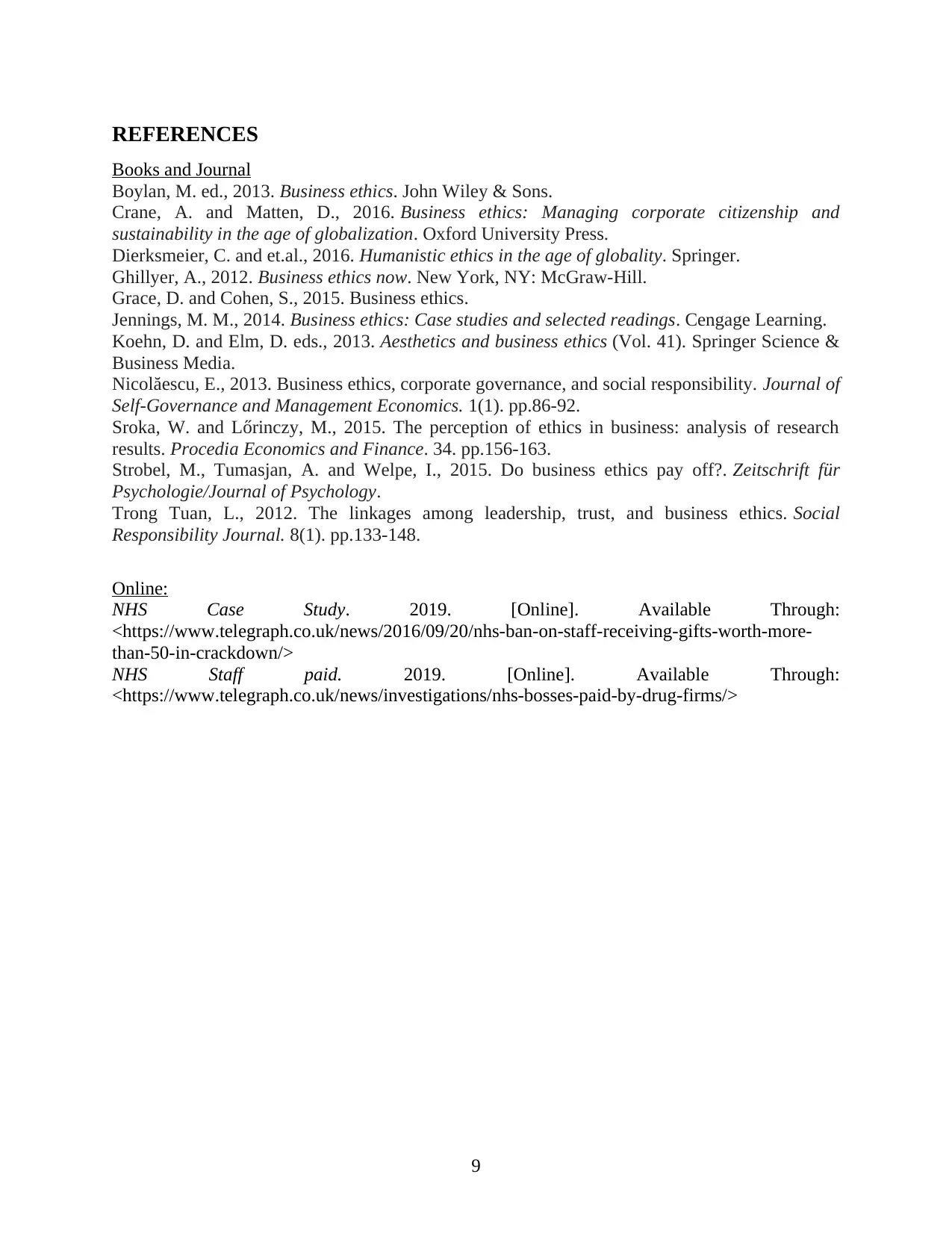
REFERENCES
Books and Journal
Boylan, M. ed., 2013. Business ethics. John Wiley & Sons.
Crane, A. and Matten, D., 2016. Business ethics: Managing corporate citizenship and
sustainability in the age of globalization. Oxford University Press.
Dierksmeier, C. and et.al., 2016. Humanistic ethics in the age of globality. Springer.
Ghillyer, A., 2012. Business ethics now. New York, NY: McGraw-Hill.
Grace, D. and Cohen, S., 2015. Business ethics.
Jennings, M. M., 2014. Business ethics: Case studies and selected readings. Cengage Learning.
Koehn, D. and Elm, D. eds., 2013. Aesthetics and business ethics (Vol. 41). Springer Science &
Business Media.
Nicolăescu, E., 2013. Business ethics, corporate governance, and social responsibility. Journal of
Self-Governance and Management Economics. 1(1). pp.86-92.
Sroka, W. and Lőrinczy, M., 2015. The perception of ethics in business: analysis of research
results. Procedia Economics and Finance. 34. pp.156-163.
Strobel, M., Tumasjan, A. and Welpe, I., 2015. Do business ethics pay off?. Zeitschrift für
Psychologie/Journal of Psychology.
Trong Tuan, L., 2012. The linkages among leadership, trust, and business ethics. Social
Responsibility Journal. 8(1). pp.133-148.
Online:
NHS Case Study. 2019. [Online]. Available Through:
<https://www.telegraph.co.uk/news/2016/09/20/nhs-ban-on-staff-receiving-gifts-worth-more-
than-50-in-crackdown/>
NHS Staff paid. 2019. [Online]. Available Through:
<https://www.telegraph.co.uk/news/investigations/nhs-bosses-paid-by-drug-firms/>
9
Books and Journal
Boylan, M. ed., 2013. Business ethics. John Wiley & Sons.
Crane, A. and Matten, D., 2016. Business ethics: Managing corporate citizenship and
sustainability in the age of globalization. Oxford University Press.
Dierksmeier, C. and et.al., 2016. Humanistic ethics in the age of globality. Springer.
Ghillyer, A., 2012. Business ethics now. New York, NY: McGraw-Hill.
Grace, D. and Cohen, S., 2015. Business ethics.
Jennings, M. M., 2014. Business ethics: Case studies and selected readings. Cengage Learning.
Koehn, D. and Elm, D. eds., 2013. Aesthetics and business ethics (Vol. 41). Springer Science &
Business Media.
Nicolăescu, E., 2013. Business ethics, corporate governance, and social responsibility. Journal of
Self-Governance and Management Economics. 1(1). pp.86-92.
Sroka, W. and Lőrinczy, M., 2015. The perception of ethics in business: analysis of research
results. Procedia Economics and Finance. 34. pp.156-163.
Strobel, M., Tumasjan, A. and Welpe, I., 2015. Do business ethics pay off?. Zeitschrift für
Psychologie/Journal of Psychology.
Trong Tuan, L., 2012. The linkages among leadership, trust, and business ethics. Social
Responsibility Journal. 8(1). pp.133-148.
Online:
NHS Case Study. 2019. [Online]. Available Through:
<https://www.telegraph.co.uk/news/2016/09/20/nhs-ban-on-staff-receiving-gifts-worth-more-
than-50-in-crackdown/>
NHS Staff paid. 2019. [Online]. Available Through:
<https://www.telegraph.co.uk/news/investigations/nhs-bosses-paid-by-drug-firms/>
9
1 out of 11
Related Documents
Your All-in-One AI-Powered Toolkit for Academic Success.
+13062052269
info@desklib.com
Available 24*7 on WhatsApp / Email
![[object Object]](/_next/static/media/star-bottom.7253800d.svg)
Unlock your academic potential
Copyright © 2020–2026 A2Z Services. All Rights Reserved. Developed and managed by ZUCOL.





